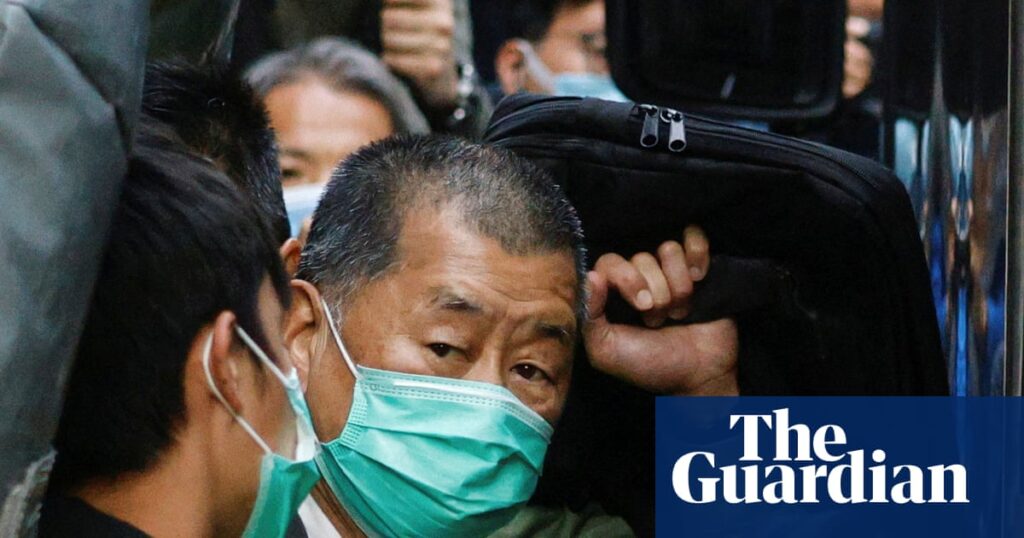Final arguments have concluded in the national security trial of the pro-democracy media tycoon Jimmy Lai in Hong Kong.
Government-picked judges are retiring to consider their verdict in the case, seen internationally as a crucial test of the rule of law in the city.
Lai, 77, has been in prison since 2020, when he was charged with two counts of conspiracy to collude with foreign forces and one count of conspiracy to publish seditious material.
The charges were brought under a sweeping national security law (NSL) imposed by Beijing after anti-government protests in 2019, and a colonial-era sedition law.
Often referred to as the Rupert Murdoch of Asia, Lai was one of the few Hong Kong business leaders willing to criticise Beijing, which has labelled him a “modern day traitor” and “riot supporter”.
The case is the most high-profile example of the Hong Kong government’s crackdown on the pro-democracy opposition in the city under the NSL, which broadly outlawed any act of dissent.
According to his lawyers and family, Lai has various health issues, including a heart problem. He faces up to life in prison if convicted.
Asked about the timing of a verdict on Thursday, one of the three judges overseeing the case said it would be announced “in good time”. Lai’s trial, similar to other national security cases, is being presided over by designated judges instead of a jury, a departure from the city’s common law system.
Closing arguments by the prosecution and the defence began last week, after delays caused by bad weather and then concerns over Lai’s health. They concluded on Thursday morning.
Lai, dressed in a beige linen blazer and white shirt, smiled, nodded and waved at the public gallery before being escorted away by corrections officers. He also raised his thumb a few times.
Prosecutors accused Lai of using his media outlet, Apple Daily, and foreign political connections to lobby for governments to impose sanctions and other punitive measures against Chinese and Hong Kong authorities. They said he showed “unwavering intent”, and that the alleged collaborations were “long term and consistent”, beyond the introduction of the NSL.
His alleged collaborators included the activist Andy Li and paralegal Chan Tsz-wah, both of whom testified against him at trial, and the Interparliamentary Alliance on China. He was also accused of financing the advocacy group Stand with Hong Kong.
In court, Lai’s defence team said prosecutors had failed to provide sufficient evidence for the claims of conspiring with Li, Chan, or other alleged co-conspirators to request foreign sanctions after the NSL’s introduction.
Marc Corlett KC said that the prosecution’s submission that Lai stayed in contact with former US defence officials “goes in no way to demonstrate” their case because those individuals had not been named as “co-conspirators”.
The senior counsel Robert Pang had earlier defended Lai’s newspaper, Apple Daily, saying “it is not wrong to support freedom of expression. It is not wrong to support human rights”.
Pang told the court the media’s role was to facilitate public discourse, and that Apple Daily’s position was one of a wide variety of views taken by Hong Kong’s many outlets. “Apple Daily was not calling for public debate,” he said. “Apple Daily was part of the public debate.”
Lai was arrested alongside several others including executives at his company, during a raid on the Apple Daily newsroom and associated locations in August 2020. He was granted bail but then taken into custody in December that year and has remained behind bars ever since, on remand and then serving sentences for other convictions related to pro-democracy protests and fraud charges which his supporters say were trumped up. Apple Daily was forced to close in June 2021.
The prosecution of Lai has been widely criticised by foreign governments, legal organisations and rights groups, in particular the ultimately successful efforts of the Hong Kong and Beijing authorities to block Lai’s chosen lawyer, the UK barrister Tim Owen KC, from defending him. The authorities have rejected criticism, labelling Lai “a voluntary political tool of foreign forces trying to curb China through Hong Kong”.
The trial stretched to 156 days, far beyond the 80 days initially set down. The closely watched hearings were often attended by supporters and international observers, including foreign diplomats based in the city, who would line up for hours to secure limited seating.
Lai took the stand in November, the first time he had been heard in public since his not guilty plea in January that year. He said he never tried to influence foreign policy or ask foreign officials to take concrete action on Hong Kong.
Shortly after his arrest in 2020, while at home on bail, Lai told the Guardian his case would be a “litmus test” of Hong Kong’s legal system since the NSL. He said the pro-democracy movement’s ultimate goal of gaining complete democracy for Hong Kong was no longer possible, but they had to keep fighting.
“We don’t know when we’ll win, but we’re so sure we’re on the right side of history, and time is on our side,” he said.


